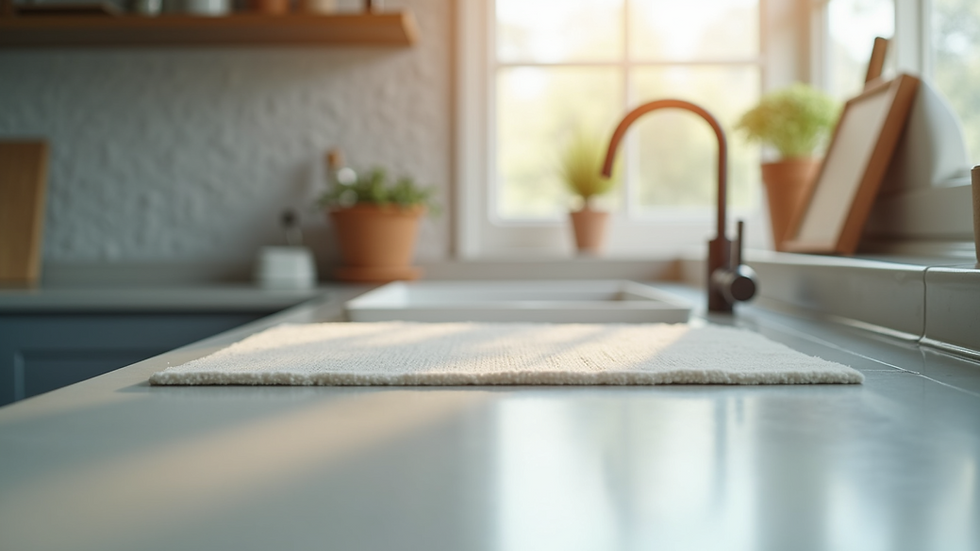The Impact of Cleanliness on Physical Health: Exploring Preventive Benefits
- Netta Hines
- Jul 6
- 3 min read
Cleanliness is often said to be next to godliness, but its significance stretches far beyond a simple phrase. Research increasingly links cleanliness to better physical health. In a world filled with distractions and fast-paced living, keeping our surroundings clean is vital not only for aesthetics but also for preventing disease and improving our overall well-being.
In this blog post, we will examine how regular cleaning prevents illnesses and boosts physical health. Let’s explore the various aspects of cleanliness and its significant effects on our health.
Understanding the Importance of Cleanliness
Cleanliness is crucial for maintaining a healthy lifestyle. It encompasses more than just tidying up; it involves removing dirt, germs, and allergens that can endanger our health. This is especially important in homes, where families spend a great deal of time.
A clean home can greatly reduce harmful bacteria and allergens. For example, studies show that maintaining cleanliness can lead to a reduction in respiratory conditions, including asthma, by as much as 30%. This shows how necessary it is to create an environment that protects us from infections and supports a healthier lifestyle.
The Role of Germs and Allergens
Every day, we face exposure to various germs and allergens, some of which can be harmful. In dirty conditions, germs flourish. Dust, dirt, and grime can accumulate, allowing bacteria, viruses, and mold to thrive.
Effective cleaning routines significantly lower these risks. Regularly wiping down surfaces and disinfecting high-touch areas, like doorknobs and light switches, can cut the spread of germs by nearly 80%. Moreover, replacing or cleaning air filters can improve indoor air quality and reduce allergy triggers. This simple step can help alleviate symptoms for the 24 million adults in the U.S. diagnosed with asthma, providing them with better respiratory health.
Cleaning and Disease Prevention
Establishing a clean environment is a proactive way to avoid diseases. Research indicates that those living in cleaner settings experience fewer respiratory infections and stomach illnesses. One study found that participants who increased their cleaning habits reported a 40% decrease in illnesses compared to those who did not.
Public health initiatives that promote cleanliness in schools and hospitals further underline its importance. Cleanliness practices in these spaces can greatly reduce the transmission of contagious diseases, helping to maintain a healthier population.

Mental Well-being Benefits of Cleanliness
Cleanliness affects not just our physical health but also our mental well-being. A tidy and organized environment can lower stress levels and boost productivity. Clutter can be distracting, impacting our focus and mental clarity.
Keeping our spaces clean fosters a sense of accomplishment and peace. When we clean regularly, we create an uplifting atmosphere that benefits mental health. Many people find that after cleaning, they feel more relaxed and better prepared to tackle daily tasks.
Practical Tips for Ensuring Cleanliness
Create a Cleaning Schedule: Develop a regular cleaning timetable. Break tasks into daily, weekly, and monthly chores. This makes cleanliness manageable and less overwhelming.
Opt for Eco-Friendly Products: Choose non-toxic, environmentally friendly cleaners. They are safer for your family and the earth. Research shows that using these products can reduce exposure to harmful chemicals by up to 50%.
Regular Decluttering: Make it a habit to declutter regularly. Fewer items in your home mean fewer places for dirt and dust to accumulate.
Prioritize Ventilation: Ensure good airflow in your home. Simple actions like opening windows can significantly improve indoor air quality and decrease pollutants.
Collaborate on Cleaning: If you live with family or roommates, involve everyone in cleaning tasks. Working together cultivates shared responsibility and makes the process enjoyable.

The Hygiene Hypothesis
According to the Hygiene Hypothesis, less exposure to germs during childhood can lead to higher risks of allergies and autoimmune diseases later in life. While a clean environment is vital for health, finding balance is essential. Over-sanitizing can hinder our immune systems from developing effectively.
This perspective highlights the need for children to experience a clean yet somewhat germ-friendly environment. Striking the right balance can strengthen immunity while preventing harmful illnesses.
Embracing Cleanliness for Health and Well-being
The connection between cleanliness and physical health is clear—maintaining a clean environment is essential for preventing illness and enhancing overall well-being. Good cleaning practices not only help diminish harmful germs but also support mental wellness through a peaceful home atmosphere.
By using practical cleaning strategies and appreciating the benefits of cleanliness, we can take actionable steps to boost our health. Investing time in a clean environment is investing in our well-being. As we look ahead, embracing cleanliness brings significant improvements to our lives, creating healthier homes and communities for everyone.
Reflect on the importance of cleanliness in your life. Consider taking small steps to prioritize your health. Your well-being will thank you for it!

.jpg)

